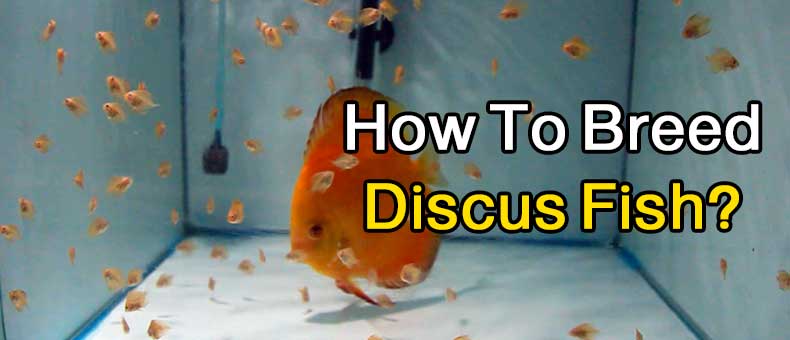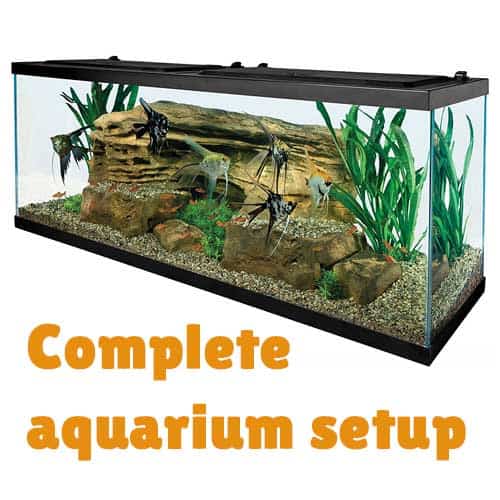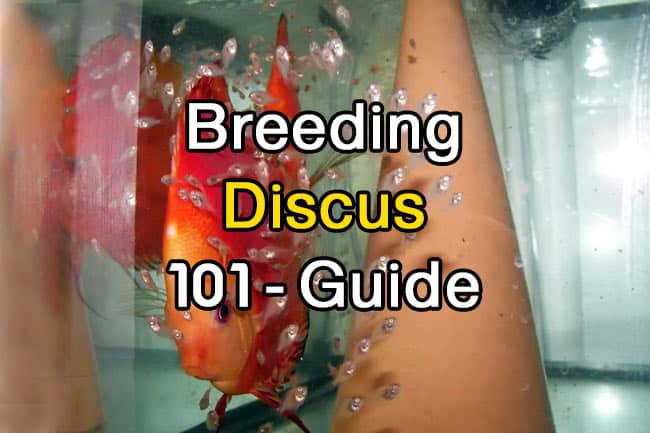
If you like having discus fishes in your aquarium or willing to make a business out of it, then you may be interested in breeding them.
Table of Contents
- How Do You Breed Discus Fish?
- Encouraging Discus To Breed
- [1] – Keep Several Discus Fishes In The Tank
- [2] – Keep Discus In A Large Tank
- [3] – Measure And Adjust Nitrites, Ammonia, And Nitrates
- [4] – Keep Water Hardness Between 1dH And 8dH
- [5] – Frequently Change A Portion Of Tank Water
- [6] – Use Timers To Keep Lights On Or Off
- [7] – Feed Animal Protein To Your Discus
- [8] – Add Zones Of Spawning In The Tank
- [9] – Watch For Mated Pairs
- [10] – Introduce Methylene Blue Into The Aquarium
- [12] – Use Sponge Filters Or Air Stones
- [13] – Decide, Raising Young Discus In A Separate Tank Or With Their Parents?
- Raising Discus With Parents
- Raising Discus Without Parents
- Related Questions
- Conclusion
How Do You Breed Discus Fish?
To breed your discus, you need to first select a breeding pair. After selecting the pair, then go on to prepare a breeding tank. then spawn your discus fish. I will describe in detail all the Discus breeding processes step by step in the below guide.
Encouraging Discus To Breed
Before getting to breed Discus fish, you need to create conditions that will facilitate breeding, this is done through the following steps:
[1] – Keep Several Discus Fishes In The Tank
This is necessary to raise the odds of having both males and females in the tank. If you are considering how to pair discus fish, it is recommended to have at least four discus fish in the tank while the more the better, to boost up the odds of having both a male and a female discus fish.
[2] – Keep Discus In A Large Tank
If the tank in which discus are kept is too small, they will be less likely to breed. The ideal discus breeding size of the aquarium has a depth of 38 cm (15 in), at least. If you only want to keep a pair of discus, your tank should be able to hold 50 water gallons. Use a tank that can hold 50 to 60 gallons if you want to keep 4 – 6 discus fishes.
[3] – Measure And Adjust Nitrites, Ammonia, And Nitrates
Procure water testing kits and other tools that can help you measure the content of your tank water from aquarium stores. The water is toxic to your discus fish if the level of nitrite (denoted by i) and ammonia is more than 0 ppm, or the nitrate level (denoted by a) of the water exceeds 20 ppm.
Test the other conditions of the tank water thoroughly:
Discus is a warm creature, and so the temperature of your tank water should be at least 28°C (82°F) or more for it to be a suitable condition. pH should be stabilized around 6.5 and never rise higher than 7.0.
Use an electronic conductivity tester to check mineral content – this should fall between 100 – 200 micro siemens. If there is a need for adjustments, it should be minimal so as to prevent discus from being harmed.
[4] – Keep Water Hardness Between 1dH And 8dH
The water hardness of the tank water should be between 1dH and 8dH so as to replicate the water conditions of the amazon river. If the water hardness of your aquarium is found to be above this range, you can soften the water by introducing driftwood into the aquarium.
[5] – Frequently Change A Portion Of Tank Water
Change 10 percent of tank water every day or change 20 – 30 percent of the water two times a week in order to keep the aquarium clean and encourage breeding. Remove litter from the bottom of the aquarium when necessary. Also, clean the sides of the tank before changing the water so that the new water won’t be clouded.
[6] – Use Timers To Keep Lights On Or Off
Ensure that you have lights installed in the aquarium and use timers to set the lights on and off. This will help discus to get used to day or night. Also, ensure to keep the night light on. Keeping discus in the dark while breeding is not advisable.
[7] – Feed Animal Protein To Your Discus
The best feed for discus fishes is a live feed which includes white worms, adult brine shrimp, or mosquito larvae for discus breeding adult-size fishes.
In the absence of live feed, provide them with beef heart or high animal protein flake food. Occasionally feed them with vitamin supplements for tropical fishes such as powdered spinach and spirulina. You can acquire disease-free live feed from hobbyists and raise them at home to further lower the risk of diseases.
[8] – Add Zones Of Spawning In The Tank
You can encourage spawning (laying of eggs) when you make spawning zones close to the aquarium floor. This also makes it easy to transfer eggs if you want to separate the parents from the young. You can use a short-length PVC pipe, an upturned flowerpot, or acquire a discus fish breeding cone from an aquarium store to use as a spawning zone.
Also, ensure that the aquarium is placed in a quiet room to encourage breeding.
[9] – Watch For Mated Pairs
Observe discus fishes closely, if you notice that a pair begin to hang out or move together, are cleaning up a spawning area, or displaying a discus breeding behavior of aggressiveness towards the other fishes in the tank, chances are that they are a male and female discus and spawning is about to happen. Take the pair out of the aquarium if they get excessively aggressive.
[10] – Introduce Methylene Blue Into The Aquarium
Add little drops of methylene blue into the tank water to protect the eggs from fungi and bacteria. You can get methylene blue from any aquarium store close to you or order methylene online. Also, get an eyedropper. (one drop per two gallons or check the instruction on the back of the drug bottle).

[12] – Use Sponge Filters Or Air Stones
In your aquarium, make use of water oxygenation and filtration methods that are gentle on discus fry to prevent discus from being sucked into the filters or getting exhausted as a result of the constant current.
[13] – Decide, Raising Young Discus In A Separate Tank Or With Their Parents?
Raising young discus (fry) with their parents tends to increase their chances of survival, on the other hand, the parents can eat them up or spread diseases. There is a possibility that raising fry with parents can turn them into better parents – this is significant if you intend to breed multiple generations of discus.
Raising Discus With Parents
[1] – Observe To Notice When The Eggs Hatch
Two or three days after the eggs have been laid, they hatch. Usually, even after hatching, the discus fry tends to remain at the site where the eggs were hatched for a period of time.
You could also use a special cage to protect the eggs from the parents to not to be eaten by them.
[2] – Reduce The Level Of Tank Water Before Detaching Of Young Discus
This is not exactly necessary, but after Discus fry detaches from the hatching site, they move to their parent’s location to feed off their parents’ skin. You can reduce the tank water levels temporarily to about 9 inches in order to allow them to easily locate parents.
[3] – Feed Fry With Baby Brine Shrimp 4 Days After They Begin to Swim
Once fry is able to swim around the tank freely for four days, you can then begin to supplement their diet with a little quantity of live baby brine shrimp four times a day.
[4] – Change Diet After 6 Weeks
Once fry is up to 6 weeks old, you can begin to feed them with a variety of foods such as animal protein and vitamin-rich vegetables. You can enquire about the recipe for ‘discus burger’ containing the ingredients mentioned above from discus breeders and find ones that fry can eat.
Raising Discus Without Parents
[1] – Move The Water Containing The Eggs Into Another Tank
Move eggs into a small tank with good tank water attributes for a higher survival rate. If the eggs were spawned on the floor and not on a spawning cone or pipe, you should move the adult discus. After that, change the tank water often.
[2] – Wait For The Fry To Begin Swimming Freely
After the eggs hatch, it will take a couple of days before young discus will begin to swim freely.
[3] – Use A Clean Source Of Rotifers To Feed Them
Rotifers are microorganisms that can be found in pond water. You can purchase clean rotifers in any aquarium store close to you. Collecting them in the wild can increase the risk of the spread of diseases.
[4] – Make Your Own Mixture Of Egg Yolk And Other Foods
You can spread egg yolk around one corner of the tank for the fry to feed on, but they will not grow as fast as they would when they are fed with rotifers. Mix baby brine shrimp and spirulina with the egg yolk for extra nutrition.
Related Questions
Is It Hard To Breed Discus Fish?
Discus fishes are quite difficult to breed, and in most cases, if it’s your first time breeding, there is little or no chance for the fish to survive. Of all the fishes kept in a tank, only young discus feed off of the skin of their parents, and this makes it easier to breed them if they are kept together in the same aquarium.
If, however, you want to use a controlled environment for breeding discus so as to prevent them from contracting any diseases or being cannibalized you should feed them with nutrients that can adequately replace the nutrients gotten from the parents.
Conclusion
Breeding discus fish is not so difficult if you follow the right guide. Follow the steps outlined above, especially if you have no experience. If you find any difficulties, you can consult the services of an expert.




